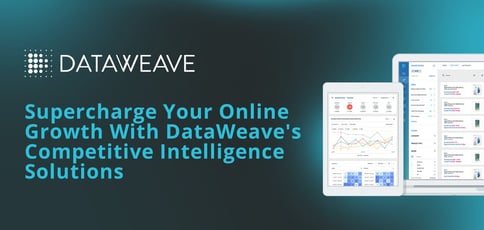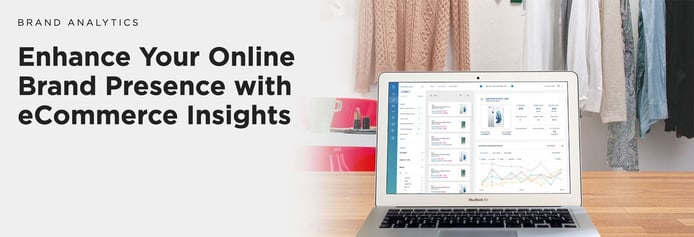
TL; DR: DataWeave’s AI-powered competitive intelligence helps retailers and brands discover, monitor, and visualize publicly available information — such as pricing and social media data — to inform decision-making. The hosted SaaS product makes it easy for users to access retail insights, run analytics, and aggregate data via APIs, dashboards, and visualizations. With solutions that empower users to tap into the wisdom of the ecommerce community and resources for the gig economy, DataWeave plans to provide intelligent data to an even broader customer base.
Buckle up, online retailers and brands: To successfully navigate today’s ecommerce landscape, you’ll have to traverse miles and miles of data — taking in not just the information in your lane, but in those of your competitors as well.
“Benchmarking through outside-in data is like driving on a freeway,” said Krishnan Thyagarajan, President and COO of DataWeave. “You’re observing your internal data: your tire pressure, fuel gauge, speedometer, warning lights. But getting from point A to B is also a function of variables outside of your car — other drivers, road conditions, traffic lights.”
That external data, known as competitive intelligence, provides insights that can be used to create applications or make strategic business decisions. But while valuable information is publicly available, it’s often difficult to collate manually, existing in various formats that are challenging to understand.

DataWeave is a SaaS-based solution for leveraging the power of competitive intelligence.
That’s where DataWeave comes in. The company’s hosted Competitive Intelligence-as-a-Service platform helps users discover, monitor, and visualize online public data to inform pricing, product assortment, brand perception, and share of voice.
“Doing that at scale, in a predictable and consistent manner, is one of the ways we differentiate ourselves,” Krishnan said.
DataWeave’s distributed data aggregation platform acquires millions of data points across different devices, languages, geographies, and verticals. Data can be accessed via developer-friendly APIs as well as a SaaS-based web portal that provides customized insights through dashboards, reports, and visualizations.
Moving forward, DataWeave hopes to continue helping users with a broad range of backgrounds — from large consumer brands to those in the digital native gig economy — harness data to drive better decision-making.
Providing Competitive Intelligence as a Service Since 2011
DataWeave has provided its machine-learning enabled SaaS platform to consumer brands and digital commerce businesses in need of competitive intelligence for nearly ten years.
“We started off in India, way back in 2011, with our first set of products hitting the market in November 2012,” Krishnan said. “These were smaller markets in India and Southeast Asia in the early days of commerce, and we quickly found success.”
The team caught wind of significant economic activity in the North America market and subsequently set up locations in California, Maryland, and Washington. Most of the company’s customer-facing employees work out of these offices, with tech talent primarily remaining in Bangalore.

Retailers turn to DataWeave for insight on tackling the online market.
“In the last four and a half years, North America has become by far the largest market for us, generating more than three-fourths of our revenue,” Krishnan said. “We consistently receive positive feedback from these customers, which is very encouraging to us.”
In recent years, the ecommerce industry has enjoyed consistent market growth, with online sales representing 16% of all retail sales in 2019 (up from 14.4% in 2008). According to Krishnan, the global pandemic significantly altered that dynamic.
“By April, that number went up to 27% — so, in historical numbers, the ecommerce industry received 10 years of growth in eight weeks,” Krishnan said. “Most companies, both on the retail and private side, were caught napping, and you’re seeing the downstream impact of that now as bankruptcy rates rise.”
In addition to an overall increase in sales, some in the ecommerce industry are moving from a national focus to a strategy involving hyper-local promotions and offerings. At the same time, shoppers are shifting their product discovery efforts from Google and other search engines to marketplaces, such as Amazon.
Both factors influence where a company spends its promotional dollars — and data related to these trends is hosted publicly online. Ultimately, DataWeave’s goal is to help retailers and brands acquire, analyze, and leverage this expanding universe of online data to improve marketing efforts and boost sales.
Retail Insights, Brand Analytics, and Data Aggregation
Krishnan told us that competition is becoming increasingly heated in the COVID era. While customers shopping at brick-and-mortar establishments tend to purchase items on a whim, online shippers weigh the various options available at their fingertips in terms of cost, delivery time, and product choice, among other factors.
And, with expanded delivery options on the rise, such as curbside pickup, he said retailers can no longer view online storefronts and physical stores as separate sales channels.
“Some transactions originate online and are completed in the store, while others start with window shopping and end with an online transaction,” Krishnan said. “The whole experience must be seamless.”

Brands trust DataWeave to transform raw information into strategy.
DataWeave’s hosted platform helps brands and retailers compete under this intense pressure by optimizing competitive intelligence on product mix and pricing. The platform is very prescriptive in its recommendations, according to Krishnan.
“With DataWeave, the C-suite can start to build a price perception model, deciding to compete more or less aggressively in certain areas based on the data,” he told us. “On top of this, we enable you to provide these insights at the ZIP-code level, which, in an advanced country like ours, has a huge impact in terms of better results and better profitability.”
Retailers can also use the data to inform promotional strategies, shifting marketing dollars to the product categories that are most competitively priced. Or, they can use the data to prioritize merchandising product mixes based on assortment analytics that identify in-demand items.
Tap into the Wisdom of the Ecommerce Community
On the brand side, DataWeave helps users convert traffic to business via optimization techniques in three areas: search, product information, and availability. In terms of search, DataWeave’s job is to provide brands with insights on factors like ranking and visibility that essentially allow them to access the wisdom of the ecommerce community.
“To show up in the top 10 or 15 listings on a search engine, there’s a lot of work that has to be done on the backend,” Krishnan said. “By providing constant insights, we can inform how brands spend their marketing dollars, what search terms they are buying, etc., so more of their SKUs will show up in searches.”
DataWeave’s content audit and optimization solution, on the other hand, helps brands ensure retailers are providing correct and complete titles, product descriptions, and images, among other information.
“We provide brands with recommendations on parameters where scores are low so they know what to fix on the retailer side,” Krishnan said. “This is very important, because when consumers visit a product page and don’t get the information they need, they bounce, and you lose the sales.”
The hosted platform also offers resources for availability and pricing at the ZIP-code level. DataWeave’s proprietary scoring mechanism provides information on inventory trends to help inform the brand’s supply chain.
“So these three areas, when optimized, enable a consumer to go to a retailer site to find the product, interact with the product, and then complete their transaction,” Krishnan said. “That’s why we refer to this as a digital shelf solution.”
Now Serving Customers in the Digital-Native Gig Economy
As DataWeave evolves, Krishnan told us the company plans to help those in the gig economy — think grocery delivery, prepared food delivery, and shared taxis — aggregate data from apps.
“For websites on the desktop, we already aggregate data at scale with high levels of precision,” he said. “But we have similar capabilities for apps, which require completely different technologies.”
Because of that, DataWeave is attracting the attention of gig economy companies.
“We now have several customers in this area, which is a digital-native space,” Krishnan said. “Demand for the types of insight we provide is going to skyrocket pretty quickly, and we hope to be a leader in that area.”
HostingAdvice.com is a free online resource that offers valuable content and comparison services to users. To keep this resource 100% free, we receive compensation from many of the offers listed on the site. Along with key review factors, this compensation may impact how and where products appear across the site (including, for example, the order in which they appear). HostingAdvice.com does not include the entire universe of available offers. Editorial opinions expressed on the site are strictly our own and are not provided, endorsed, or approved by advertisers.
Our site is committed to publishing independent, accurate content guided by strict editorial guidelines. Before articles and reviews are published on our site, they undergo a thorough review process performed by a team of independent editors and subject-matter experts to ensure the content’s accuracy, timeliness, and impartiality. Our editorial team is separate and independent of our site’s advertisers, and the opinions they express on our site are their own. To read more about our team members and their editorial backgrounds, please visit our site’s About page.

